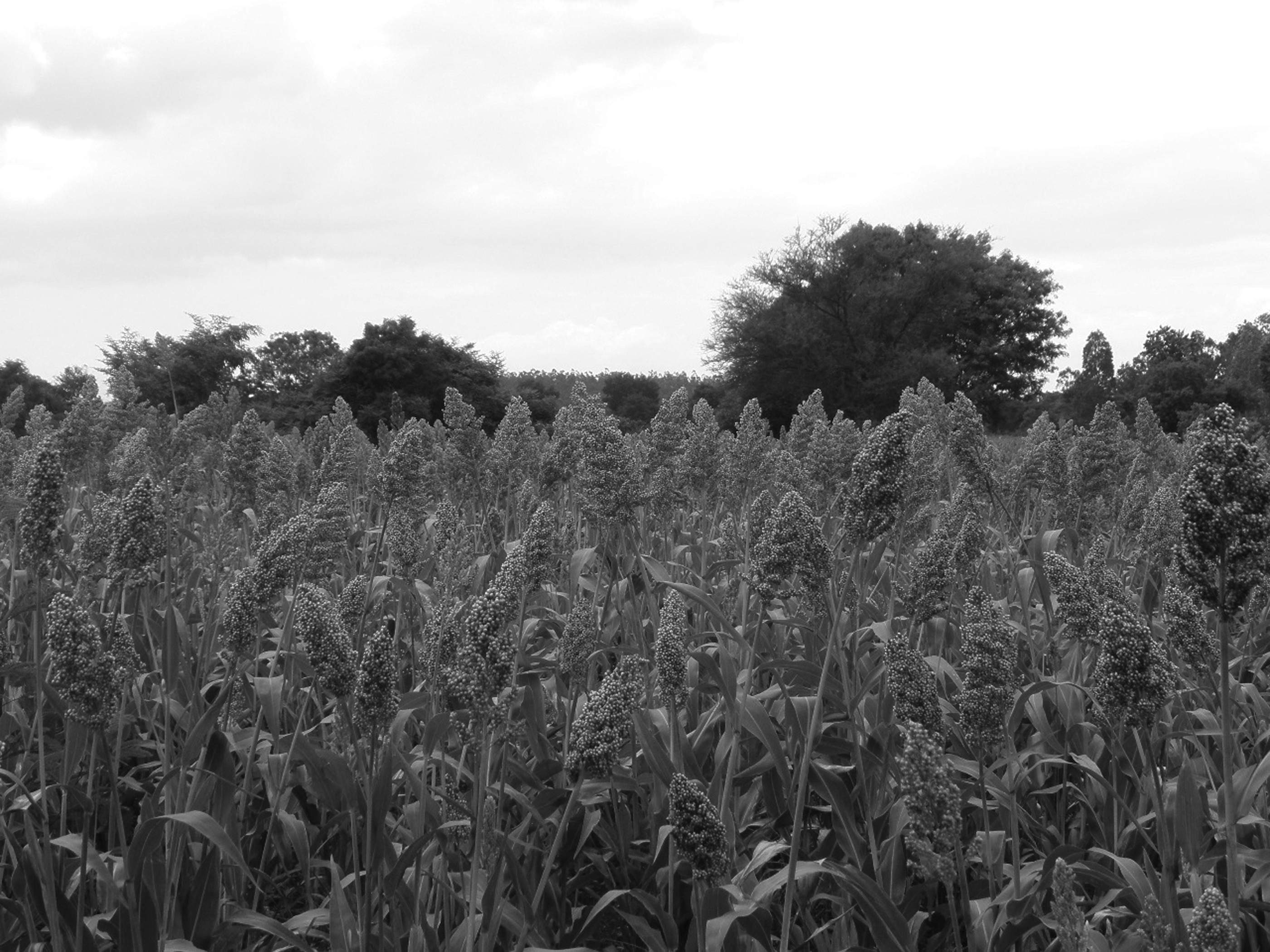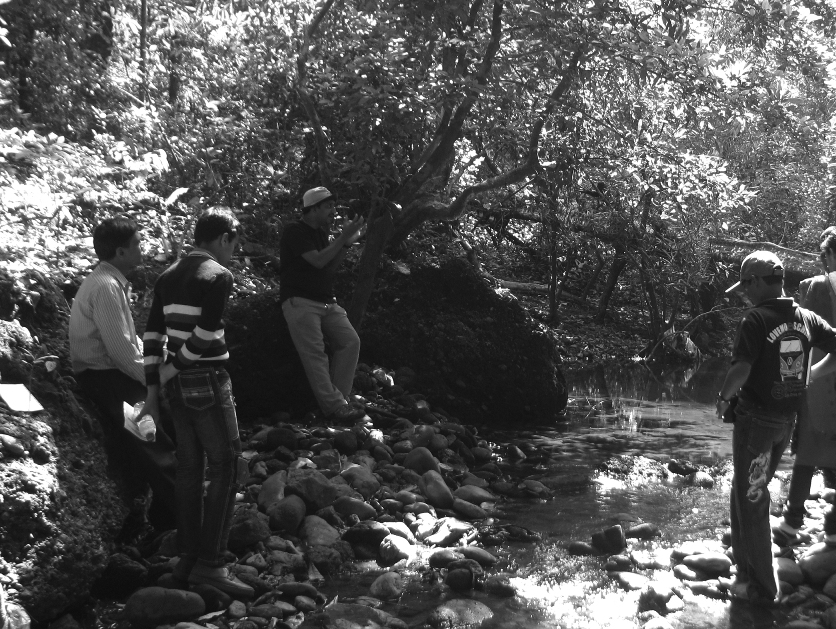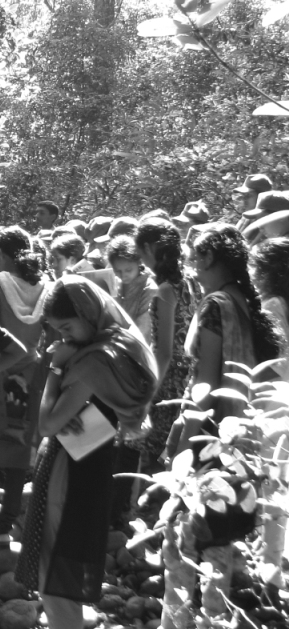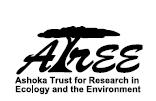
Change of Advisory Board
- Please join us in welcoming ATREE’s new Advisory
Board members.
- Dr. Vijay Raghavan, Director, National Centre for
Biological Sciences, Bengaluru
- Dr. Raghavendra Gadagkar, INSA SN Bose Research
Professor and JC Bose National Fellow, Centre for
Ecological Sciences, Bengaluru
- Dr. Amita Baviskar, Associate Professor, Institute of
Economic Growth,Delhi
- Dr. Navroz K. Dubash, Senior Fellow, Centre for Policy
Research, New Delhi
- Dr. Gita Sen, Professor, Centre for Public Policy, Indian
Institute of management, Bengaluru
- Mr. Raj Khoshoo, Senior Vice President, Siemens PLM,
CA, USA
- Ms. Kalpana Sharma, independent journalist, Mumbai
- Dr. Ravi Chopra, Director, People’s Science Institute,
Dehradun, Uttarakhand
- Dr. S. P. Singh, Former Vice Chancellor, Advisor, State
Planning Commission, Government of Uttarakhand,
Dehradun, Uttarakhand
- Dr. Ramesh Singh, Director, Learning, Monitoring
and Evaluation, Office of the Director of Programs,
Open Society Institute, New York
|

In post independent India, productivity was the measure of agricultural performance. With huge investments in irrigation and electrification, the Indian farmer, propped up with government schemes and subsidies,experimented with ‘high yielding’ processes, methods
and seeds. In recent years the euphoria has waned as scientists and farmers take stock of depleted natural resources and stagnant yields. The grim situation of
the farmers—about 60% of India’s population—their dependence on the monsoon—55% of land tilled—
farmer suicides, outcry against GM, have led to greater reflection on this fixation with productivity.
Sheetal Patil et al look at the sustainability—in financial
and environmental terms—of alternative practices in
agriculture in the long term. The study was conducted
in Mysore and Chitradurga districts in Karnataka state,
in 2009, three years from the implementation of the
Karnataka State Policy on Organic Farming (KSPoOF), and
extrapolated to 2015. It compared organic agriculture
with practices followed by the green revolution, now
embedded in the practices of three generations of
farmers, involving extensive use of chemical fertilizer
and pesticide, irrigation, dependence on high yielding
seed varieties, shifts to commercial crops, and increased
crop rotation. |
- With this, we also bid a grateful adieu
to outgoing members for their guidance
and contributions over the last few years:
- Dr. Dan Martin, Conservation International,
Washington DC, USA
- Dr. Jagmohan Maini, Former Coordinator,
United Nations Inter-Governmental Panel
on Forests, New York, and Former Chairman,
Board of Trustees, Centre for International
Forestry Research, Bogor, Indonesia
- Dr. Peter Raven, President, Missouri Botanical
Garden, St. Louis, USA
- Dr. R. A. Mashelkar, CSIR Bhatnagar Fellow
at National Chemical Laboratory, Pune, India,
and Former Director General, CSIR, New
Delhi, India
- Dr. Nandini Sundar, Professor of Sociology at
the Delhi School of Economics, has stepped
down from the ATREE Governing Board.
|
 |
 |
With different type and number of
crop rotations in different seasons,
the researchers computed technical
coefficients using TechnoGIN
(technical coefficient generator) –
a tool that helps analyse multiple
resource use efficiencies. The
evaluation was carried out for a set
of environmental and economic
indicators for both conventional
and organic farming. Economic
sustainability has been measured
by taking the sum total of yields, net
fertilizer and labour costs, and net
returns/ losses. If net returns were
high enough to sustain livelihood,
and risks moderate, the system
was considered economically
sustainable. Since the KSPoOF was
introduced to promote organic
farming as a way to buffer farmers
from debts, the team paid particular
attention to the risks associated
with each farming practice, and,
in particular, examined debts/
economic losses in case of total crop
failure. Environmental sustainability
required that the cultivation practice
not deplete natural resources over
the long term. Indicators used were
nutrient loss and balance in soil and
biocide residue index. |
The findings suggest that organic
farming can be a sustainable practice,
depending on regional conditions
and crops cultivated.
Findings
In Chitradurga, which is a dry region,
financial returns from organic farming
are generally higher than from
conventional farming. With current
level of nutrient application, nutrient
balance in the soil is negative for
most of theselected crop rotations,
indicating that without replenishing
soil nutrient levels, it might not
be possible to sustain comparable
yields in the long term. The depletion
of nutrients in soil is higher with
organic farming, and would require
maintenance of livestock, crop
residues and vermi-compost to
maintain a positive nutrient balance
in the long term.
In Mysore, which is a wetter region,
with greater cropping intensity, the
yields and returns from organic and
conventional farming are similar.
Nutrient losses with organic farming
are about half as compared with
conventional farming. Also, nutrient
application with organic farming |
practice in Mysore was higher than
optimal for all crop rotations.
The researchers suggest that organic
farming can be an economically
viable option in Chitradurga, but not
in Mysore. For both places, losses due
to crop failure were similar in both
the farming practices. In Chitradurga,
economic loss due to complete
crops failure was lower with organic
farming than with conventional
farming practice.
Replicating the tools and techniques
used in this study, it may be
possible to assess economic and
environmental sustainability of a
farming practice for different regions.
Note: This study was possible with
support from Land Use Policies
and Sustainable Development in
Developing Countries (LUPIS) project.
Read the complete article at
doi:10.1016/j.landusepol.
2012.01.006
Outreach
The wetland conservation programme
at Vembanad has been able to
use local religious sentiment and
custom to spur local conservation
action. It was based on the idea
that the purification of mind, body
and soul, central to the Sabrimala
pilgrimage and penance, could be
applied to the Vembanad lake as well.
The pilgrimage is associated with
a 41-day mandalam season, when
pilgrims abstain from anything the |
faith deems unclean. The ATREE
team used this religious sentiment to
declare plastic unclean for Vembanad,
and persuaded fishers to undertake a
41-day clean up campaign.
In absolute terms, it got the
lake relatively plastic free. More
importantly, it addressed a practical
and recurring problem: fishers had
always had plastic waste entangled in
their nets, and they always removed
the waste and threw it back in the
lake. The plastic cleaning campaign
got fishers to redirect this last step—
from allowing plastic to re-enter the
lake, it got them to collect the plastic
and take it ashore for recycling.
Learning from this campaign
One of the reasons this campaign
worked was because of the timing.
According to the CERC coordinator,
Jojo R, “No other timing could
have worked better. The feeling
associated with the mandalam
season contributed greatly to the
success of the campaign.” Second,
he says, fishers and clam collectors
acted as a group in this campaign.
For them, plastic was a nuisance, so
the campaign message resonated at
a practical level. Third, the Vembanad
fisher community has traditionally
been a part of other ATREE
programmes like the annual fish
survey, where, this year—the fourth
annual fish count, decline in fish and
clam populations were also directly
attributed to plastic pollution. And
declining fish populations threaten
livelihood security—a reason close
to home. Fourth, this stakeholder
community was already organised
into the community-based Lake
Protection Forums, whose initiatives
for conservation and sustainability,
ATREE has been encouraging over
the past years. Last but not the least,
the CERC promised to reward best
team and individual collector. |
The mandalam campaign lasted from
17 November to 29 December 2011.
The campaign spread to fisherfolk
outside the forums. Local MLA
P Thilothaman promised that the
issue of plastic pollution will be
brought up in the legislative assembly
and a policy level intervention will
be made regarding this issue, as
well as the issue of fisher folks’
livelihoods. Muhamma Grama
Panchayat President Mrs Deepa
Ajith Kumar redirected the plastic
waste into road tarring. A report in
The Hindu newspaper is available
at http://www.thehindu.com/news/
states/kerala/article2653543.ece#.
TwqSeqbr4FQ.email
R Jojo, Vembanad
The most exciting moment for DNA
Club (Department of Biotechnology’s
Nature Awareness Club) members is
the opportunity to go on a field trip.
Students get to spend time close
to nature and observe different
ecosystems. This helps them learn
and appreciate the importance of the
natural world in a human dominated
landscape. For those students who
have never been out of their villages,
this is a great opportunity to learn. .JPG) |

|
ATREE, in its role as Regional
Resource Agency organised a field
trip for its DNA club members of
SDM High School, Ujire and Jaycees
School, Sringeri at Seethanadi Nature
Camp, Hebri on 27th and 28th
December 2011. Dr Aravind NA held
the introductory for the nature camp,
explaining differences in forest
types, importance of grasslands,
river ecosystem and so on. Students
were then taken on a nature trail
where they observed giant squirrels,
birds, butterflies, spiders, dragonflies
and other interesting creatures that
they had not noticed before. During
the walk, he introduced them to
the diversity of flora and fauna,
epiphytes, parasites, and concepts
like mimicry, camouflage and
mutualism in the natural world |
Students created a map of Seethanadi
river, which helped them observe
different types of flora in the riverine
ecosystem. They got to see different
kinds of fresh water fishes at close
quarters and learnt to differentiate
them by sketching.
The day ended with an activity to
make students aware that trees
harbour a rich and complex variety
of life. Each student selected a tree
and spent time observing it carefully.
They drew an outline of the shape of
the tree and marked what they saw
on it. This also made the students get
connected with the tree personally.
Abhisheka K |
On invitation from the Indian
Navy Service at Vijayanarayanam
near Tirunelveli, a bird watching
training programme was conducted
on 27th December 2011 by the
Agasthyamalai Community-based
Conservation Centre (ACCC).
50 students from Kendriya
Vidyalaya, 25 women and 30 sailors
participated in this event. T Ganesh,
Soubadra Devy, Mathivanan,
Saravanan and Thamizhazhagan
from ACCC helped participants
identify birds and explained how
birds can be monitored using SMS.
The group will participate in the
annual waterfowl census conducted
by ATREE.
T Ganesh, Agasthyamalai |

For the third successive year, the
ATREE-WHBPI project in Assam
granted scholarships to high school
students from the fringe villages of
Manas and Kaziranga National Parks.
The objective of such a scheme was
to raise conservation awareness
among the recipients. 90 students
benefited from the scheme at each
site. The students were selected
based on a combination of need
and merit, with preference for lowincome
groups and families affected
by human-wildlife conflict. The
programme was held in association
|
with the park authorities and local
community-based organisations.
Niraj Kakati, Assam
New
Lele, S. Elected to Board of International
Society for Ecological Economics
Avik Ray, Sumangala R. C., G. Ravikanth,
R. Uma Shaanker and Suhel Quader.
2011. Isolation and characterization
of polymorphic microsatellite loci
from invasive plant Lantana camara.
L. Conservation Genetic Resources
DOI 10.1007/s12686-011-9501-9
Harisha R. P. 2011. Livelihood and
potential conservation roles of wild
edible herbs. International Society of
Ethnobiology Newsletter 3 (2):1-2>
Vinayaka, K. S., R. Siddappa Setty and
Y. L. Krishnamurthy. 2011. Utilization
of lichens in the Central Western
Ghats area of Karnataka, India. British
Lichen Society Bulletin 109: 57-62
Mohana Kumara P., S. Zuehlke, Priti V,
Ramesha B. T., Shweta S., G. Ravikanth,
Vasudeva R., T. R. Santhoshkumar,
M. Spiteller and R. Uma Shaanker.
2011. Fusarium proliferatum, an
endophytic fungus from Dysoxylum
binectariferum Hook.f, produces
rohitukine, a chromane alkaloid
possessing anti-cancer activity.
Antonie van Leeuwenhoek Journal of
Microbiology DOI 10.1007/s10482-
011-9638-2
Purushothaman, S. and R. Abraham.
2011. Scaling up and sustainability |
The experience from rural India.
Sustainability in Debate. 2(2):21-42
Paper in edited book
Lele, S. 2011. Climate change and the
Indian environmental movement. In:
A Handbook of Climate Change and
India. Navroz Dubash (ed). Oxford
University Press, Delhi. pp. 208-217
Ravikanth G., Srirama R., Senthilkumar
U., K. N. Ganeshaiah and R. Uma
Shaanker. 2011. Genetic resources
of Phyllanthus in southern India-
Identification of geographic and
genetic hot-spots and its implication
for conservation. In: Phyllanthus
species: Scientific evaluation and
medicinal applications. Ramadasan
Kuttan and K. B. Harikumar (ed). CRC
Press, Taylor and Francis, Florida. pp:
97-118
Popular press
Lele, S. 2011. Thinking about and
responding to climate change: How
and why should we care? Teacher
Plus. December, Vol.9 (11): 30-34.
Lele, S., I. Patil, S. Badiger, A. Menon and
R. Kumar. 2011. Forests, hydrological
services, and agricultural income:
A case study from Mysore district
of the Western Ghats of India. At
Nature, Economy and Society: 6th
Biennial Conference, Indian Society
for Ecological Economics. 20 Oct
2011, Hyderabad
Lele, S. 2011. NTFP-based livelihoods:
Role and challenges in rainfed areas.
Panel discussion on Alternative
paradigms for rainfed areas. In 6th
INSEE Biennial Conference on Nature,
Economy and Society. Indian Society |

for Ecological Economics. 20 Oct
2011, Hyderabad
Lele, S. 2011. Unpacking frameworks
for interdisciplinary analysis of
social-ecological systems. Preconference
workshop on Pathways
to Interdisciplinarity. Indian Society
for Ecological Economics. 20 Oct
2011, Hyderabad
Lele, S. 2011. Ecological economics
as an interdisciplinary framework:
Strengths and limitations. Panel
discussion on Power and culture in
ecological economics in 6th INSEE
Biennial Conference on Nature,
Economy and Society. Indian Society
for Ecological Economics. 22 Oct
2011, Hyderabad
Lele, S. 2011. Keynote address.
Sustainability assessment and EIA.
Azim Premji University. 9 Nov 2011,
Bangalore |
Lele, S. 2011. Understanding REDD+
and GIM. Workshop on Voices of
the vulnerable: Speaking climate
change and development to Durban
and beyond. Organised by Indian
Network on Ethics in Climate Change.
15 Nov 2011, Bangalore
Lele, S. 2011. REDD+: Dense forest
ahead. South Asia Media Briefing
Workshop on Climate Change. Centre
for Science and Environment. 16 Nov
2011, Delhi
Lele, S. Panelist. Book release event.
Politics of Climate Change and
the Global Crisis: by Praful Bidwai.
Centre for Contemporary Studies. 1
Dec 2011
Purushothaman, S. Environmental
governance in India – some
lessons from production land use.
Preparatory seminar for Rio+ 20 at
Centre for Sustainable Development,
University of Brasilia. Oct 2011 |
Purushothaman, S. Implications of
trends in access, benefits and status
of common lands in Karnataka (with
Lele, S.). International Conference on
Public Policy and Management. IIM
Bangalore. Dec 2011.
Purushothaman, S. Policies and
socio-ecological changes in agrarian
Karnataka: An empirical assessment.
ATREE. Dec 2011.
Purushothaman, S. Problems and
prospects for PES in coffee forestry
ecotones. At a session on the
Payments for Ecosystem Services
for the different landscapes of
Kodagu: A policy document. College
of Forestry, Ponnampet. Nov 2011.
(With Abraham, S)
Ravikanth G., Recovering endangered
species. To botany students of College
of Arts Science and Commerce,
Quepem, Goa ATREE, 9 Nov 2011. |
Siddappa Setty R. Climate change and
mitigation. At Earthwatch programme
for HSBC employees. Banerghatta
National Park, Bengaluru.
24 Sept 2011.
Siddappa Setty R. Conservation and
livelihood work in BRT. To visiting
DePaul University students on 6
Dec 2011; and students of Indian
Institute of Forest Management on
26 Dec 2011
Siddappa Setty R. Forest Right Act and
conservation. Workshop on Property
Rights and Development organised
by Liberty Institute in association
with SUGRAMA for elected women of
Grama Panchayat. 16 Nov 2011.
Siddappa Setty R. gave ten talks
on Environment and sustainable
use of natural resources. For Gram
Panchayat representatives of Hasan,
Tumkur, Udupi, Raichur, Koppal,
Davanagere and Haveri district at
Mahatma Gandhi Institute of Rural
Energy and Development, from
October to December 2011
CEPF-ATREE Western Ghats
Programme Coordinator Bhaskar
Acharya attended a Nature
Conservation Foundation (NCF)-
Rainforest Alliance workshop
(funded by CEPF) on Sustainable
Agriculture Network (SAN) Standards
local interpretation guidelines and
training event in Bangalore, on 18
and 19 November 2011.
The focus of the workshop was review
of the draft of local interpretation
guidelines prior to wider consultation
and implementation of the SAN
Standard in the field, in the factory,
and at the group level. |
Representatives from Rainforest
Alliance, Nature Conservation
Foundation (as SAN member), various
NGO partners, and SAN Auditors
reviewed the interpretation and
interacted with and trained various
coffee and tea producers.
Nilmani Rabha, Research Assistant
with the ATREE-WHBPI project in
Assam, attended a national training
programme on Conducting Effective
Research on Large Carnivore Ecology
and Habitats, organized by H.N.
Gujarat University in partnership with
the Smithsonian Institution-Global
Tiger Initiative Conservation and
Development Network, Smithsonian
Conservation Biology Institute, USA,
held at Dudhwa National Park, Uttar
Pradesh from October 9 to 15, 2011.
YETI 2011 throws up strategies to
meet conservation challenges in NE.
The Hindu. 16 December
Students’ seminar on NE ecology
at IIT-Guwahati. Times of India. 14
December 2011
Ecological experts call for open
data sharing at YETI. The Hindu. 14
December 2011
Young ecologists to discuss
biodiversity issues. 4 December
2011. IBN Live.
IIT to host ecology meet. The
Telegraph. 26 November 2011.
41-day campaign to clean Vembanad
Lake. The Hindu. 23 November 2011.
Why activists and scientists should
talk to each other. The Alternative.
17 Nov 2011. |
GIS mapping gaining popularity.
Economic Times. 13 October 2011.
Some freshwater molluscs in Western
Ghats under threat. The Hindu. 10
October 2011.
Check the latest issue of Nesara
– bilingual newsletter of DBT’s
Natural Resource Awareness Club
and Agasthya – the Agasthyamalai
team newsletter at http://atree.org/
newsletters.  |
 www.atree.org www.atree.org |
Head Office
Bangalore
Royal Enclave, Sriramapura
Jakkur Post, Bangalore 560 064
Tel: +91-80-23635555,
Fax: +91-80-23530070
Regional offices
Eastern Himalayas
Khangsar House,
Above Brahmakumari, Development Area
Gangtok 737101
Tel: +91-3592-206 403
New Delhi
2nd Floor, 1, K Commercial Complex
Birbal Road, Jangpura Extension
New Delhi 110014
Tel: +91-11-2432 3133
Governing Board
Dr. Kamaljit S. Bawa (Chairman)
Dr. K. N. Ganeshaiah
Dr. R. Uma Shaanker
Dr. S. N. Rai
Mr. Darshan Shankar
Ms. Rohini Nilekani
Dr. Surinder M. Sehgal
Dr. Jeta Sankrityayana
Ms. Seema Paul
Ms. Pheroza J. Godrej
Dr. K. S. Jagadish
Mr. A. N. Singh
Dr. Ganesan Balachander
Dr. Gladwin Joseph (ex-officio)
Dr. Priyadarsanan Dharma Rajan
(faculty)
Executive Committee
Dr. Gladwin Joseph (Chair)
Dr. Bejoy Thomas
Dr. Seema Purushothaman
Dr. Siddhartha Krishnan
Dr. Siddappa Setty
Mr. Ramesh N
Dr. Priyadarsanan Dharma Rajan
Dr. Sarala Khaling (ex officio)
Mr. Sridhar R Iyengar (ex officio) |
Advisory Board
Pl note: * will also serve on the Faculty
Advisory Committee
* Dr. Vijay Raghavan, Director, National
Centre for Biological Sciences, Bengaluru
Dr. Raghavendra Gadagkar, INSA SN Bose
Research Professor and JC Bose National
Fellow, Centre for Ecological Sciences,
Bengaluru
* Dr. Amita Baviskar, Associate Professor,
Institute of Economic Growth, Delhi
* Dr. Navroz K. Dubash, Senior Fellow,
Centre for Policy Research, New Delhi
* Dr. Gita Sen, Professor, Centre for Public
Policy, Indian Institute of Management,
Bengaluru
Mr. Raj Khoshoo, Senior Vice President,
Siemens PLM, CA, USA
Ms. Kalpana Sharma, independent
journalist, Mumbai
Dr. Ravi Chopra, Director, People’s Science
Institute, Dehradun, Uttarakhand
* Dr. S. P. Singh, Former Vice Chancellor,
Advisor, State Planning Commission,
Government of Uttarakhand, Dehradun,
Uttarakhand
Dr. Ramesh Singh, Director, Learning,
Monitoring and Evaluation, Office of
the Director of Programs, Open Society
Institute, New York
Convenors and Programme Leaders
Dr. Jagdish Krishnaswamy,
Ecosystem Services and Human Well-being
and Convenor, Suri Sehgal Centre for
Biodiversity and Conservation
Dr. Sharachchandra Lele,
Forests and Governance and Convenor,
Centre for Environment and Development
Dr. Priyadarsanan Dharma Rajan
and Dr. Ankila Hiremath,
Ecosystems and Global Change
Dr. Shrinivas Badiger
Land Water and Livelihoods
Academy
Dr. Aravind N. A.,
Coordinator, Academy for Conservation
Science and Sustainability Studies
This newsletter has been put together from
reports by ATREE folk. Design and lay out is b y
Salil Sakhalkar. Editing by Samuel Thomas and
Meetu Desai. |
|



